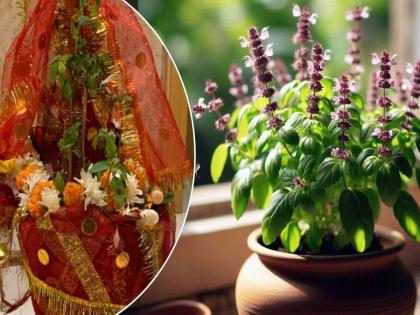Tulsi Vivah 2024: Date, Shubh Muhurat Time, Puja Vidhi, Rituals, and Spiritual Significance
By Lokmat English Desk | Updated: November 13, 2024 15:12 IST2024-11-04T14:37:13+5:302024-11-13T15:12:01+5:30
Tulsi Vivah, a revered Hindu festival, celebrates the ceremonial marriage of Goddess Tulsi (a manifestation of Goddess Lakshmi) with ...

Tulsi Vivah 2024: Date, Shubh Muhurat Time, Puja Vidhi, Rituals, and Spiritual Significance
Tulsi Vivah, a revered Hindu festival, celebrates the ceremonial marriage of Goddess Tulsi (a manifestation of Goddess Lakshmi) with Lord Vishnu, symbolized by the Shaligram stone. Observed every year on the Dwadashi (twelfth day) of the Kartik Shukla Paksha, this auspicious day marks the end of the Chaturmas period and ushers in the Hindu wedding season. In 2024, Tulsi Vivah will be celebrated on November 13, with rituals performed to invoke blessings for marital harmony, prosperity, and family well-being. The festival brings families together in devotion, reinforcing cultural values and seeking divine grace for happiness and unity in married life.
Date and Timing for Tulsi Vivah 2024
Date: In 2024, Tulsi Vivah will be celebrated on November 13.
Tithi: The Dwadashi (twelfth day) of Kartik Shukla Paksha begins on November 12 at 4:04 PM and ends on November 13 at 1:01 PM. Due to Udaya Tithi (the Tithi at sunrise), the celebration is set for November 13.
Shubh Muhurat (Auspicious Timing):
The main auspicious time for the Tulsi Vivah ceremony is from 1:00 PM on November 13. It is also recommended to perform rituals in the evening, ideally between 5:29 PM and 7:53 PM on November 13, as per traditional customs.
Also Read: New Tulsi Vivah Rangoli Designs 2024: Easy and Beautiful Rangoli Patterns, Images To Decorate Your Home and Celebrate Prabodhini Ekadashi.
Tulsi Vivah Rituals and Preparation
Buy a Tulsi plant, typically over three years old, is decorated as a bride with a red cloth and adorned with jewelry, symbolizing her as Goddess Lakshmi. For puja setup a mandap (wedding canopy) is set around the Tulsi plant using sugarcane and branches of Amla or Tamarind, creating a festive space for the ritual.
Wedding Ceremony: The marriage follows Hindu wedding customs, including tying a turmeric mangalsutra to Tulsi and performing traditional wedding rites. Devotees recite mantras and songs, and the ceremony resembles a traditional Hindu wedding.
Offering Prasad: After the puja, Panchamrit (a mixture of milk, yogurt, honey, sugar, ghee, and a basil leaf) is offered as prasad to honor the divine union.
Significance of Tulsi Vivah
Spiritual Beliefs: Tulsi is regarded as a sacred form of Goddess Lakshmi, symbolizing purity, devotion, and fidelity. Marrying her to Lord Vishnu is thought to bless couples with marital bliss, prosperity, and a harmonious family life.
Cultural Importance: Tulsi Vivah signals the conclusion of Chaturmas (the four-month period during which auspicious events are traditionally avoided) and ushers in the wedding season in Hindu culture.
The festival reinforces family bonds, spiritual devotion, and cultural traditions, providing an opportunity for devotees to seek blessings for happiness, marital strength, and harmony in their lives.
Open in app